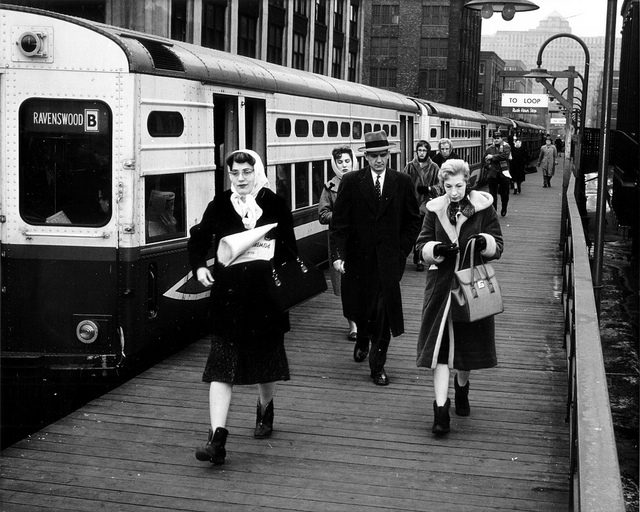Chicagoist Presents A New Story By Barry Gifford: 'Role Model'
By Rob Christopher in Arts & Entertainment on Dec 9, 2016 5:00PM
As we've done annually since 2009, we're proud to continue a Christmastime tradition by presenting a new story by Barry Gifford. It will appear in his book The Cuban Club, forthcoming from Seven Stories Press in 2017.
Barry Gifford
On Roy’s fourteenth birthday he came home from school and found his mother sitting alone at the kitchen table drinking a cup of coffee and reading Holiday magazine.
“Hi, Ma,” he said. “What are you reading?”
“An article about Brazil. You know I was there once at Christmas.”
“You told me. Who were you there with?”
“Oh, a boyfriend. It was before I met your father. We spent a week in Rio. The beaches were lovely, the sand was so white, but very crowded, as crowded as Times Square on New Year’s Eve. The Carioca girls were almost naked, brown and slithery and beautiful. I had a wonderful time.”
“Why haven’t you ever gone back?”
“Rio’s not the kind of place your father would have liked, and since he died I’ve not had the opportunity.”
It was a dreary day, drizzly and gray and colder than usual for the time of year. Roy knew his mother preferred warm weather.
“It’s my birthday today.”
“I know, Roy. Are you going out with your friends?”
“Later, maybe. Right now I’m going to work. I just came home to change my clothes.”
“Your father always dressed well. People used to dress better in the old days.”
“You mean in the 1940s?”
“Yes. Before then, too.”
“Well, I’m going to be boiling hot dogs and frying hamburgers. It wouldn’t be a good idea for me to wear a suit.”
“No, Roy, of course not. That’s not what I mean. It’s just that people cared more for their appearance when I was young.”
“This is 1961, Ma, and you’re only thirty-four. You’re still young.”
Roy was standing next to the table. His mother looked up at him and smiled. She really is still beautiful, he thought. She had long auburn hair, dark brown eyes, perfect teeth and very red lips.
“I know you miss your father, Roy. It’s a shame he died so young.”
“He was a strong person,” Roy said. “People liked and respected him, didn’t they?”
“Yes. He handled things his own way. People trusted him. You know your father never gave me more than twenty-five dollars a week spending money, but I could go into any department store or good restaurant and charge whatever I wanted. I’ll tell you something that happened not long after he and I were married. We were living in the Seneca Hotel, where you were born, and there was another couple in the hotel we were friends with, Ricky and Rosita Danillo. Rosita was a little older than I—she was from Puerto Rico—and Ricky was a few years younger than your dad, who was nineteen years older than me.”
“What business was Ricky in?”
“Oh, the rackets, like everybody in Chicago, but he wasn’t in your father’s league. He looked up to Rudy. Anyway, late one afternoon your father came home and I was wearing a new hat, blood red with a veil, and he said it looked good on me. I told him I was just trying it on. He asked me where I’d gotten it and I said it was a gift from Ricky Danillo, that I’d come back to the hotel after having lunch with Peggy Spain and the concierge handed me a hatbox with a note from Ricky.”
“What did the note say?”
“I don’t remember exactly, something about how he hoped I’d like it, that when he saw it in a shop window he thought it suited my style. Your dad didn’t say anything but the next day when I went down to the lobby I saw that one of the plate glass windows in the front was boarded up. I asked the concierge what happened and he told me that Rudy had punched Ricky Danillo and knocked him through the window, then told the hotel manager to put the cost of replacing it on his bill. That night I said to your dad, ‘You knocked Ricky through a plate glass window just because he bought me a hat?’ ”
“What did he say?”
“‘No, Kitty, I did it because he didn’t ask me first.’ That’s the kind of guy your father was. I didn’t say another word about it.”
“What happened to the hat?”
“I never wore it. I gave it away to someone.”
Roy did not tell anyone at work that it was his birthday and afterwards he was too tired to go anywhere. When he got home there was a chocolate cake on the kitchen table with fifteen yellow candles stuck in it. His mother wasn’t home. He picked up a book of matches that was on the stove and lit the candles, then took off his wet jacket and draped it over the back of a chair. Roy thought about making a wish but he couldn’t think of one. He blew out the candles anyway.
